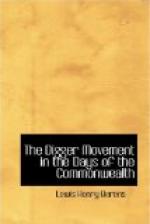Winstanley, moreover, fully and clearly realised that:
“THE KING’S OLD LAWS CANNOT SERVE A FREE COMMONWEALTH.”
And this formed the heading of his next chapter, in which in a specially lively manner he first points out that the Laws of a Monarchy—which, being based upon inequality, necessarily tend to produce inequality, and whose main function is to legalise and to maintain privileges—are necessarily essentially different from those suitable to a Free Commonwealth—which, being based upon the recognition of the equality of rights, would necessarily tend to produce an equality of social conditions; and whose main function would be to establish and to legalise Justice, equal rights and equal duties, to maintain and to enforce the equal claims of all to the use of the earth, to life, to liberty, and to the pursuit of happiness. It commences as follows:
OF KINGLY LAWS.
“The King’s Old Laws cannot govern in times of Bondage and in times of Freedom too. They have indeed served many masters, Papish and Protestant. They are like old Soldiers, who will but change their name, and turn about, and as they were. The Reason is because they are the prerogative will of those, under any Religion, who count it no Freedom to them unless they be Lords over the minds, persons and labors of their bretheren.
“They are called the King’s Laws, because they are made by the King. If any say they were made by the Commoners, it is answered, They were not made by the Commoners as the Commoners of a Free Commonwealth are to make Laws. For in the days of the King none were to choose or be chosen Parliament Men, or Law Makers, but Lords of Manors, and Freeholders, such as held title to their Enclosures of Land, or Charters for their Liberties in Trades, under the King, who called the Land his, as he was the Conqueror or his successor. All inferior people were neither to choose nor be chosen. And the reason was because all Freeholders of Land and such as held their Liberties by Charter, were all of the King’s interest; and the inferior people were successively of the rank of the




